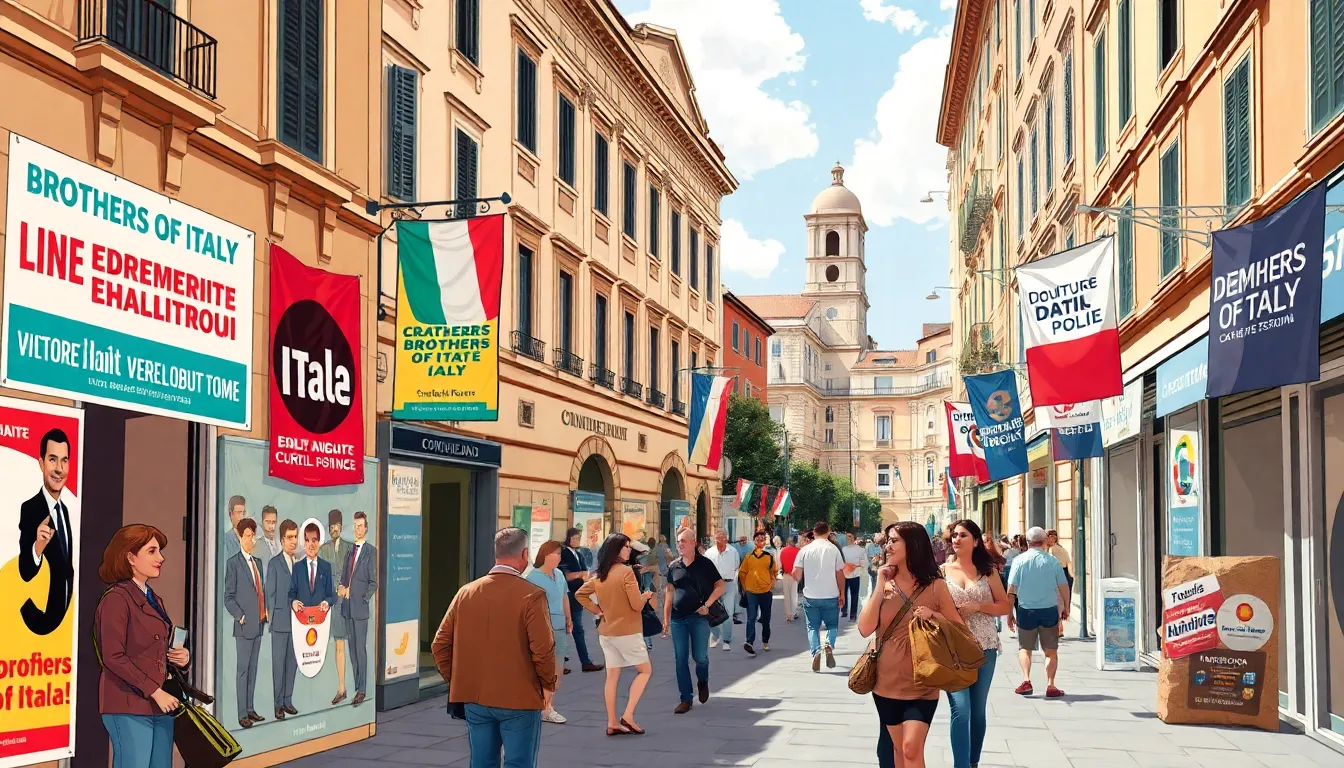Italy’s political landscape is as vibrant and unpredictable as a game of calcio on a rainy Sunday. With a rich history of passionate debates and dramatic shifts, the country’s politics often resemble a riveting opera—full of plot twists, colorful characters, and the occasional scandal that leaves everyone gasping.
From coalition governments that seem to change faster than the seasons to fiery speeches that could rival Shakespeare, understanding Italy’s political scene is essential for anyone wanting to grasp the heartbeat of this beautiful nation. As the world watches, the stakes are high, and the drama unfolds daily. Buckle up for a journey through the latest political happenings in Italy, where every headline has the potential to surprise, amuse, and inform.
italy news politics
Italy’s political scene exhibits significant complexity and fluidity. Changes in political leadership occur frequently, reflecting a dynamic coalition landscape. In recent years, various parties, such as the Brothers of Italy and the Democratic Party, have played pivotal roles in shaping policy. Observers notice that the influence of populism continues to rise, impacting traditional party structures.
Frequent elections mark Italy’s political history, demonstrating its commitment to democratic processes. Electoral laws have evolved, aiming to create more stable governance. Political dramas unfold as parties negotiate coalitions, often resulting in surprising alliances. These alliances highlight the importance of compromise within Italian politics.
Recent developments showcase Italy’s response to pressing issues. Economic challenges remain a top priority, with debates about fiscal policies and public spending shaping discussions. Migration policies also contribute to political discussions, prompting strong opinions and national debate. Political leaders address these topics with varying approaches.
Media plays a crucial role in shaping public perception of political events. With 39% of Italians trusting news institutions, credible reporting influences voter opinions and party support. Social media platforms also amplify political messages, reaching younger audiences and altering engagement methods.
Understanding the intricacies of Italy’s political landscape allows for deeper appreciation of its culture and society. News coverage captures the ongoing tensions, passionate debates, and evolving narratives that define Italian politics. Engaging with these developments provides insight into the nation’s character and future direction.
Recent Developments in Italian Politics

Significant changes continue to shape Italy’s political framework. Ongoing events reflect the nation’s adaptability in addressing contemporary issues.
Key Elections and Results
Regional elections held recently revealed shifting political alliances. A notable victory for the Brothers of Italy in regions like Lombardy emphasized their growing influence. The Democratic Party experienced setbacks, losing key municipalities. Another surprise emerged as smaller parties gained ground, indicating a fragmented electoral landscape. These elections highlighted the critical role local governance plays in national political discourse.
Major Political Parties
Italy’s party system remains dynamic, with pivotal players significantly impacting governance. The Brothers of Italy maintain a strong right-wing presence, advocating for stringent immigration policies. Conversely, the Democratic Party champions progressive reforms, focusing on social justice and economic stability. Populist movements continue to challenge traditional parties, demanding responses to public sentiment. Each party’s stance reflects deep-rooted cultural values and the nation’s historical context, shaping ongoing political discussions.
Impact of International Relations
Italy’s international relations significantly shape its political landscape. The country’s engagements impact both domestic policies and its image on the global stage.
Italy’s Role in the EU
Italy serves as a prominent member of the European Union. It advocates for economic stability and social solidarity among member states. The nation contributes to major EU policies, influencing discussions on migration and economic recovery. Italy’s leadership in climate action aligns with EU objectives, promoting sustainability across borders. Collaborative initiatives aim to enhance trade relationships, showcasing Italy’s commitment to unified European progress. By participating actively, Italy often impacts legislation that affects member economies.
Relations with Neighboring Countries
Italy maintains strategic relationships with neighboring countries. Cooperation with France and Germany stands out, especially in trade and cultural exchanges. Additionally, Italy addresses shared challenges, such as migration and security, through diplomatic channels. Relations with Switzerland focus on economic collaboration and cross-border initiatives. Italy’s engagement with Mediterranean nations highlights its role in regional stability, further enhancing ties through mutual interests. These partnerships reflect Italy’s desire for precision and pragmatism in international affairs.
Social Issues and Political Responses
Italy’s political landscape responds actively to social issues, especially concerning immigration and economic challenges.
Immigration Policies
Italy’s immigration policies spark continuous national debate. Recent changes reflect a trend towards stricter border controls. The current administration aims to balance humanitarian responsibilities with national interests. Italy sees an influx of migrants from North Africa, prompting discussions around integration strategies. The government emphasizes enforcement while advocating for collaboration with EU partners on broader migration solutions. Local communities often express mixed feelings, supporting humanitarian aid yet concerned about resource allocation. In 2023, public opinion shows 55% of Italians favor stricter immigration regulations, illustrating profound polarization on this issue.
Economic Challenges
Economic challenges necessitate coherent political responses in Italy. Rising inflation affects purchasing power and increases the cost of living. The government focuses on measures to stimulate job growth and support small businesses. National initiatives aim to address youth unemployment, which currently hovers around 29%. In addition, Italy’s public debt, standing at approximately €2.8 trillion, raises concerns about financial stability. Political parties debate how to manage budgetary constraints while encouraging economic development. In 2023, 63% of Italians express concern about the economy, underscoring the urgency for effective policy formulation.
Conclusion
Italy’s political landscape remains a captivating arena filled with ongoing challenges and transformations. As parties navigate complex coalitions and respond to pressing social issues, the dynamic nature of governance continues to shape the nation’s identity. The interplay between domestic policies and international relations highlights Italy’s strategic position within the European Union and its commitment to addressing economic and social concerns.
With public opinion playing a crucial role in shaping policy directions, the future of Italy’s politics will likely be marked by further debates and evolving alliances. Observers can expect a continued blend of passion and pragmatism as Italy strives to balance its rich cultural heritage with modern governance demands. The unfolding political drama promises to keep both citizens and international audiences engaged in the story of Italy’s journey forward.




